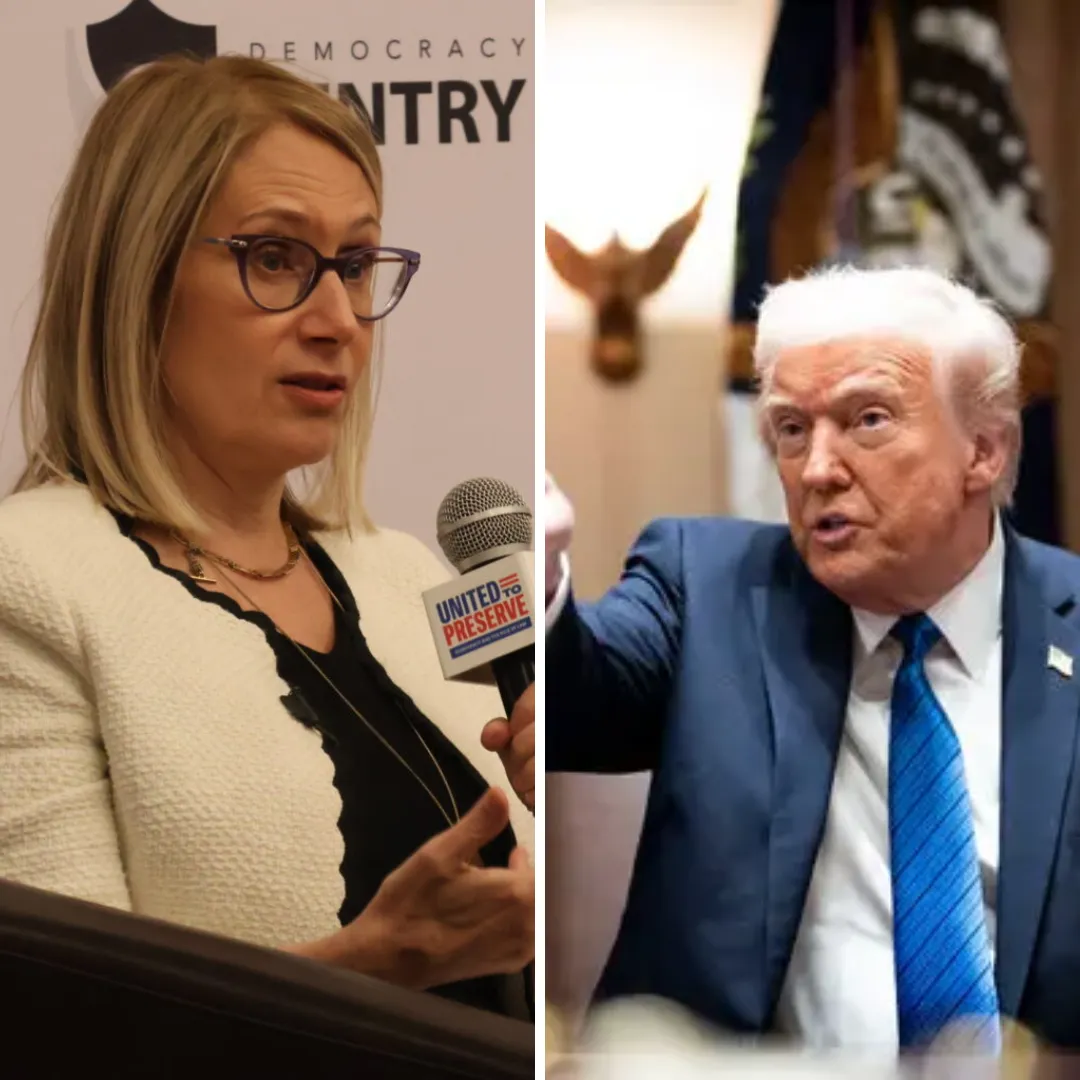
In a recent House committee hearing, a tense exchange unfolded between Democratic Representative Jasmine Crockett and Republican Representative Kevin Kiley over a highly contentious issue: whether migrants who enter the United States illegally are entitled to the same due process protections as American citizens.
The clash not only underscored the ongoing political divide over immigration policy but also brought constitutional principles into sharp focus, capturing attention on Capitol Hill and beyond.
The confrontation began when Rep. Kevin Kiley posed a pointed question to Rep. Jasmine Crockett. He asked, "Do you believe that someone who has entered the US illegally—that the due process requirements for that individual are the same as for a US citizen?"
The question carried significant weight, touching upon fundamental legal rights and the interpretation of constitutional protections in the context of immigration enforcement.
Rep. Jasmine Crockett, known for her background as a civil rights attorney, responded with a moment of sarcastic laughter that quickly drew the attention of everyone in the hearing room. Her reaction was not merely dismissive but served as a sharp commentary on the ongoing debate.
She replied firmly, "Per the Constitution, if you are on our soil, you are guaranteed due process." This statement encapsulated her view that constitutional rights are not dependent on an individual’s immigration status, emphasizing the universal nature of due process protections.
Kiley pushed back on Crockett’s assertion, citing the Supreme Court’s rulings on due process as a "context-dependent inquiry." He argued that while due process rights exist, their application can vary based on circumstances, including a person’s legal status in the country.

His perspective suggested a more nuanced interpretation of constitutional guarantees, especially in immigration cases, reflecting the complexities of law as it interacts with national sovereignty and border security.
In response, Crockett stood her ground, asserting that "There was never a distinction that said somehow, dependent on your status, you somehow lose your access to due process.
That is the only thing the Supreme Court has been consistent on, is that there are due process rights afforded to everyone." Her rebuttal reinforced her legal stance that constitutional protections do not vanish based on an individual’s unauthorized presence in the United States.
Crockett’s emphasis on consistency highlighted her belief that due process is a fundamental right, integral to the American legal system and not subject to arbitrary exclusion.
Despite Crockett’s clear explanation, Kiley remained resistant to fully embracing her interpretation. At this point, Democratic Representative Pramila Jayapal intervened in the discussion, interrupting to say, "I would like to submit for the record, the Constitution of the United States..."
This move was both symbolic and practical, drawing attention to the foundational legal document that governs American law and asserts protections for all individuals within the country's jurisdiction.
The intervention elicited laughter from members on the House floor, signaling a moment of levity amid the serious and often fraught debate. As Rep. Jim Jordan, a Republican from Ohio, quipped, "The whole Constitution, God bless ya," the chamber moved on from the tense exchange.
This comment reflected a broader acknowledgment of the Constitution’s central role in shaping policy discussions and the often theatrical nature of congressional debates.
This exchange between Crockett and Kiley illustrates the deep political and legal divisions surrounding immigration policy in the United States.
At the heart of the matter is the question of how constitutional rights apply to migrants who enter the country without authorization, a topic that has repeatedly sparked controversy and partisan debate.
Due process, a legal principle enshrined in the Fifth and Fourteenth Amendments to the U.S. Constitution, guarantees fair treatment through the normal judicial system.
It serves as a safeguard against arbitrary denial of life, liberty, or property by the government. While the Constitution does not explicitly define "due process," judicial interpretation has consistently underscored its importance as a fundamental right.
However, when it comes to immigration, the application of due process rights has been subject to interpretation and debate. The Supreme Court has ruled on various cases involving immigrants, balancing individual rights with the government's authority to control borders and enforce immigration laws.
This has led to a legal landscape where due process protections may be influenced by factors such as immigration status, detention conditions, and procedural safeguards.
Rep. Crockett’s stance reflects a view that constitutional rights, including due process, should be extended universally to all individuals physically present in the United States, regardless of their immigration status.

This perspective aligns with civil rights principles and emphasizes equality before the law. It also acknowledges the complexities faced by migrants navigating the U.S. legal system and seeks to ensure their access to fundamental protections.
On the other hand, Rep. Kiley’s position suggests a more cautious approach, emphasizing the government's role in managing immigration and national security.
His reference to the "context-dependent inquiry" by the Supreme Court highlights the legal nuances involved and the potential for different due process standards based on circumstance.
This viewpoint is often associated with efforts to prioritize border enforcement and limit certain rights for unauthorized migrants.
The interaction between the two lawmakers also underscores the broader political context in which immigration policy is debated. Immigration remains one of the most polarizing issues in American politics, with strong opinions on both sides about border security, humanitarian concerns, and the rule of law.
Congressional hearings such as this one serve as platforms for lawmakers to voice their positions, challenge opposing views, and influence public discourse.
Rep. Jayapal’s interjection to submit the Constitution for the record was a strategic move that grounded the debate in the legal framework that governs the nation.
It served as a reminder to all present of the importance of constitutional principles and the enduring relevance of the nation’s founding document. The laughter that followed indicated a recognition of the sometimes theatrical nature of legislative proceedings, even amid serious policy discussions.

This moment also brought attention to the role of the Constitution as a living document that continues to shape and guide policy decisions. The Constitution’s protections are often at the center of debates about the rights of migrants, reflecting ongoing tensions between legal ideals and political realities.
In practical terms, the question of due process rights for migrants has significant implications. It affects how immigrants are treated during detention, the fairness of removal proceedings, access to legal representation, and the standards governing government actions.
Ensuring due process is seen by many advocates as essential to upholding human rights and maintaining the integrity of the justice system.
Conversely, concerns about due process in the immigration context often relate to fears of overburdening the legal system, potential security risks, and the challenge of enforcing immigration laws effectively.
These concerns contribute to the contentious nature of the debate and the difficulty of reaching bipartisan consensus.
The hearing highlighted by this exchange is part of a larger series of congressional efforts to address immigration reform, border security, and humanitarian challenges. These efforts often involve complex negotiations, competing priorities, and deeply held values on all sides.
Representative Jasmine Crockett’s legal background as a civil rights attorney informs her perspective and advocacy for the protection of migrants’ rights.
Her approach emphasizes fairness, equality, and adherence to constitutional guarantees. Her sarcasm during the exchange conveyed frustration not only with the question posed but also with the broader political climate that questions fundamental rights.

Representative Kevin Kiley’s stance represents a viewpoint that emphasizes the enforcement of immigration laws and the government’s prerogative to regulate who is entitled to certain protections.
His insistence on the Supreme Court’s "context-dependent inquiry" points to the ongoing legal debates surrounding immigration and due process.
The laughter and light-hearted remarks following the intense exchange provided a brief respite but also highlighted the performative aspects of congressional hearings.
While lawmakers debate with passion and conviction, these proceedings also involve strategic communication aimed at shaping public opinion and legislative outcomes.
This episode serves as a microcosm of the national conversation on immigration—a dialogue marked by legal complexity, political division, and human impact. It underscores the need for informed debate that respects constitutional principles while addressing practical challenges.
Moving forward, the debate over migrants’ due process rights will continue to be a central issue in American politics. Balancing the protection of individual rights with the enforcement of immigration laws remains a delicate task for policymakers.
Representative Crockett’s insistence on universal due process protections challenges policymakers to consider the fundamental rights that underpin American democracy. Her remarks call attention to the human dignity of all individuals within the country’s borders.
Representative Kiley’s concerns reflect the urgency felt by many to secure borders and ensure that immigration policies serve national interests. His views highlight the complexities of applying constitutional rights in varied contexts.

The exchange also points to the importance of constitutional literacy among lawmakers and the public. Understanding the scope and limits of due process rights is essential for informed policymaking and civic engagement.
In conclusion, the spirited debate between Representatives Jasmine Crockett and Kevin Kiley over migrants’ entitlement to due process rights brought constitutional principles and political tensions to the forefront.
Their exchange illuminated the ongoing struggle to reconcile legal rights with immigration enforcement in the United States. The intervention by Representative Pramila Jayapal to submit the Constitution into the record underscored the enduring authority of the nation’s founding document in guiding these debates.
As the nation grapples with immigration policy, the conversation about due process will remain critical in shaping just and effective approaches that honor both the rule of law and human rights.




-(1600-x-2000-px)-(1080-x-1080-px)-1746423587-q80.webp)